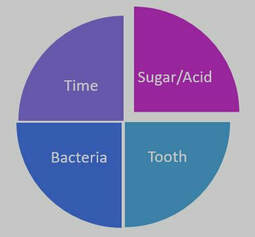I am a dental hygienist. I have practiced clinically for more than 40 years. If I have seen this scenario once, I have seen it hundreds of times. A patient who has been seen for several years comes in for routine dental hygiene care (cleaning appointment). Unfortunately, this appointment we find tooth decay starting under crowns, on molars, in areas the patients normally keeps very clean.
The dental hygienist and dentist need to be detectives in order to help the patient stop the decay. Removing the decay and placing a filling or crown is NOT the answer. Of course, this is important, but we need to know the cause and how to prevent more decay.
If we look at the four things necessary to put your teeth at risk for tooth decay, we begin by asking the patient questions with this list in mind. There are four (4) components that have to be in place to get a cavity.
- Tooth – There has to be host – a tooth. No tooth. No cavity.
- Bacteria – Bad bacteria need to be in thriving in the oral cavity.
- Sugar/Acid – The bacteria need to eat! 🙂 They thrive on fermentable carbohydrates – sugar, refined flour products, like bread and crackers, rice, potato – you know, the usual suspects. They turn these foods into acid.
- Time – The bad actors all need to stay on the tooth for at least 20 minutes. AND…the more often you eat or drink sugary or refined carbohydrates, the happier the bacteria are.
Lets investigate these one at a time.
Tooth: The crown of our teeth (the part we see) is composed of enamel. Enamel is the hardest material in the body. The acids, however, can breach that hard surface, causing a hole or cavity. Unfortunately, most adults have some periodontal disease, that results in bone loss and exposed root surfaces. Root surfaces are softer than enamel and more easily decayed. This is the area most older people develop tooth decay.
The best ways we have learned to protect the tooth from tooth decay are to:
- Reduce acid-producing bacteria in the mouth with thorough daily plaque removal (brushing and interproximal cleaning).
- Strengthen the tooth to using fluoride to reduce the ability for acids to attack the tooth. Fluoride helps strengthen the tooth at all ages. Ask your dentist and dental hygienist about fluoride options best for you.
- Further protect the tooth by choosing ‘tooth healthy’ snacks.
Bacteria: Even patients who take excellent care of their teeth can get cavities on their root surfaces. The bacteria are probably not the main culprit.
A lack of saliva can create an acidic environment in the mouth, as well. Many medications we can result in xerostomia or dry mouth. A change or addition in medication, an illness, change in diet can all affect your oral health.
Your dentist or dental hygienist should always update your medical history, including changes such as those mentioned. Sometimes it is a change we think is small or inconsequential that makes the difference.
Sugar/Fermentable Carbohydrates: As we investigate how our older adults are taking in sugar and fermentable carbohydrates, we commonly find them sneaking into their diets in small by catastrophic forms. Consider sugars in these forms (The American Dental Association has a very thorough list):
- Hard candy
- Water flavored with lemon slices; power waters, canned waters. Read the labels!
- Coffee with non-dairy creamers
- Sipping on acidic beverages over a long period of time
- sweetened coffee
- sweetened tea
- soda, especially diet soda, one of the most acidic beverages we can drink
- many fruit juices
What are some healthy alternatives? Glad you asked.
- Almonds
- White cheese
- Fresh fruits and vegetables
- Plain water
- Unsweetened tea
Time: Remember that 20 minute time frame the bacteria need to start creating the acids? It is hard to change habits, but little alterations can help. Are you sipping on your beverage or candy because your mouth is dry? Are you sipping on a beverage during the day as you work? Try these strategies:
- Change to sipping on plain water
- Consider products designed to reduce dry mouth when you talk, eat, sleep.
- Try sugarfree gum or mints
- Drink your sweetened beverages with a meal
Dry mouth, a common side effect of many medications, reduces the amount of saliva in the mouth. Saliva keeps the pH of our mouth neutral. Saliva contains minerals that help remineralize the tooth. Without it, the pH becomes more acidic and minerals are leached from the tooth in order to try to neutralize the oral environment. Ask your physician if you have a lot of trouble with dry mouth. Together you may be able to find an alternative medication.

